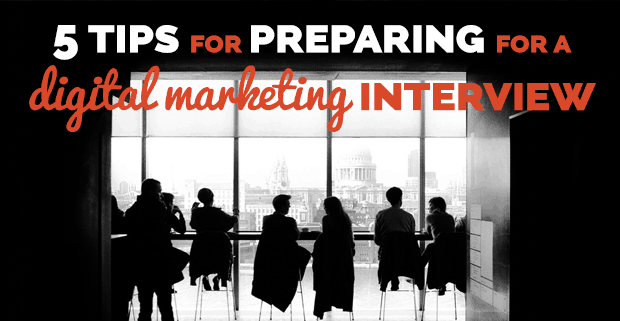
Everyone knows the basics about preparing for an interview – pick an outfit that is clean and appropriate for the job level, don’t wear too much perfume or cologne, and thoroughly research the company beforehand. I was recently involved with the interviews for digital marketing positions and was surprised to see that several of the candidates made the same mistakes.
I shouldn’t have been too surprised, given digital marketing’s embryonic state. Still, the trip-ups among the candidates were common enough that I thought I could provide some tips to anyone looking to prepare for a digital marketing interview.
1. Don’t be afraid to critique the company’s website/social media channels
You can bet that you will be asked whether you have reviewed the company’s website or social profiles. Don’t worry, this isn’t a trick question and no one is looking for your flattery. This question is asked to see what fresh insights and perspectives you can bring.
This is the perfect opportunity to illustrate that you’ve done your research on the company and that you paid extra attention to the site/social profiles. The interviewer will also appreciate hearing any suggestions you have. Comments like, “I think the site is great!” Or, “I think it could use more white space,” will lead the interviewer to believe you haven’t spent any time on the site at all.
If for some reason you aren’t asked about the website, bring it up, along with some recommendations and areas you think could be improved upon. The interviewer will appreciate knowing that you didn’t neglect to review the company’s digital properties.
2. Have an online presence
I remember being astounded at the number of candidates who hadn’t put much effort into their own digital brand. Whenever an interview with a candidate was booked, I would immediately look them up online, usually starting with LinkedIn and then moving on to Google.
What will set you apart from other candidates will be your ability to illustrate that you can take a set of data and tell a story with it.
It was a little alarming to see LinkedIn profiles without a profile picture, or public tweets that contained profanity, or blogs that hadn’t been updated in years. I couldn’t really understand why the profiles were so neglected when these candidates were applying for digital marketing roles.
If you can’t market yourself online, how can you expect your interviewer to believe you could market the company?
Spend some time on your social profiles, especially LinkedIn. An up-to-date LinkedIn profile can go a long way in making a great first digital impression.
3. It’s okay to not know everything about the digital space
The digital marketing space is varied with everything from SEO to social media marketing to marketing automation falling under the digital umbrella. If you can do most of the job as described in the posting but are a little shaky in one area, don’t panic. Rather than try to gloss it over, turn it into an advantage.
For example, if SEO isn’t your strong suit but it’s something the successful candidate will have to work on, say something like, “While my previous roles haven’t allowed for much SEO experience, I’ve taken it upon myself to stay current via SEO blogs and podcasts.” The interviewer will appreciate your honesty and your initiative to learn more on the topic.
4. Keep the jargon and buzzwords to a minimum
While it may be tempting to speak about how much you know about growth hacking, hashtags and gamification, you’ll quickly lose the interviewer’s interest if none of those terms have to do with the job you’re interviewing for.
The interview is your opportunity to illustrate what you know, not how many buzzwords you’ve memorized. You should be able to answer questions while keeping the jargon to a minimum. Provide clear, concise answers in tone that is formal and easy to understand. By relying buzzwords, you risk having the interviewer tune you out.
5. Be comfortable with analytics
Any digital marketing role will have a measurement component to it, there is no escaping that. You can find yourself working with web, social or online advertising analytics. As a result, you need to show that you are both comfortable working with the analytics and interpreting them.
Anyone can read numbers off of a spreadsheet. What will set you apart from other candidates will be your ability to illustrate that you can take a set of data and tell a story with it. Provide clear examples from previous campaigns you’ve worked on and explain how your insights helped improve the outcome of the campaign.
If you haven’t had an opportunity to work with analytics in your professional experience, then try to gain as much exposure as you can outside of work. Start a blog and install Google Analytics. Log in to your Twitter account and check out your tweets’ analytics there. There are countless online resources to help people learn about Google Analytics.
Have any questions about preparing for a digital marketing role? Feel free to ask them in the comments below!